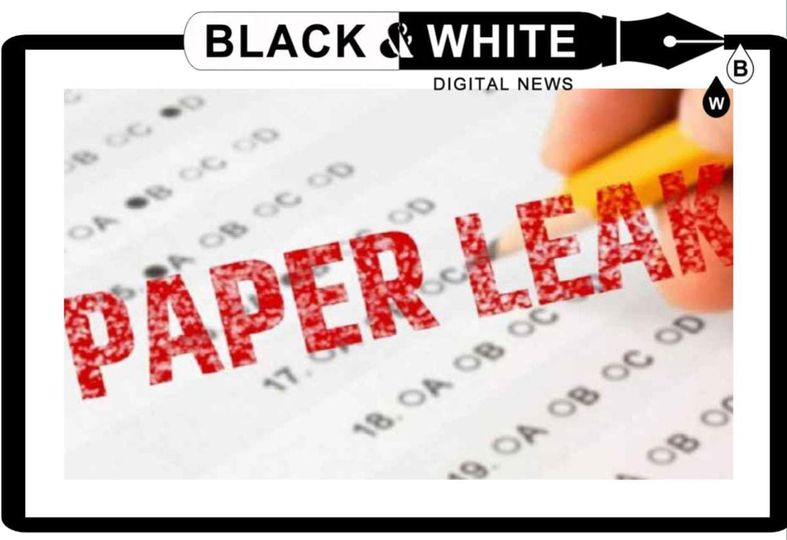Time for Serious Discussion on Exams: Youths’ Dreams Shattered and Governments’ Credibility at Stake.
Exam Paper Leaks: A National Crisis Affecting Millions of Students.
||Black and White Digital News ||
||Parvinder Singh June 29, 2024||
Exam paper leaks are not merely a localized issue affecting a particular state or political party; they represent a grave threat to the future of the nation’s youth. The recent spate of paper leaks across various competitive and entrance examinations has thrown the future of millions of students into uncertainty and put the credibility of educational institutions and government agencies at stake.
The severity of the problem is underscored by the cancellation of the UGC-NET examination after reports of paper leaks. This examination, crucial for enrolling in PhD programs, securing Junior Research Fellowships (JRF), and qualifying for assistant professorships, was scheduled across 317 cities with 1.12 million registered candidates. Similarly, the NEET-UG, an entrance exam for medical colleges, was also plagued by paper leaks, impacting a record 2.3 million applicants. The Central Bureau of Investigation (CBI) is currently investigating these leaks, and the Supreme Court is hearing the NEET-UG case. In response, the National Testing Agency (NTA) postponed several other exams, including NEET-PG.
The Widespread Nature of Paper Leaks…
Paper leaks are not confined to competitive and entrance exams; they have infiltrated school and college examinations as well. In a country like India, with its large youth population, such scandals are unacceptable and demand urgent solutions. The committee led by former ISRO Chairman K. Radhakrishnan is expected to provide recommendations to address this issue. However, the situation is dire; often, by the time one investigation concludes, another paper leak surfaces.
Paper leaks are not a recent phenomenon but a chronic issue. Over the past seven years, more than 70 examinations across various states have been compromised, affecting the careers of approximately 20 million students. Prestigious exams like the IIT-JEE in 1997 and the All India Pre Medical Test in 2011 have also been victims of leaks. The recurring nature of this issue highlights the failure of existing measures to curb it effectively.
The Impact on Students and Families:
The consequences of paper leaks are devastating. Dreams are shattered, and the hard-earned money spent by parents on their children’s education goes to waste. The government’s efforts to prevent leaks have proven insufficient. Criminal networks often hack the servers of exam-conducting agencies or collude with examination centers to leak papers. For instance, the Uttar Pradesh police recruitment exam was compromised due to the involvement of a transport company.
Inadequate Legal Measures:
Despite stringent laws enacted by central and state governments, paper leaks persist. The question arises: why do perpetrators often escape punishment despite strict legal provisions? It is evident that merely enforcing harsh penalties is not an effective solution.
Learning from Successful Models:
The Union Public Service Commission (UPSC) conducts the Civil Services Examination annually for over a million candidates without any major incidents of paper leaks. The NTA could learn from UPSC’s robust and transparent examination processes. While there is a push towards technology-based online examinations, these too are vulnerable to cyber-attacks in the era of artificial intelligence.
Political appointments in recruitment commissions should be strictly prohibited. Examination commissions should have their own secure printing facilities. Question papers should be sent to examination centers in encrypted form just minutes before the exam starts, to be printed and distributed on-site. Although this method may be more expensive, it ensures security and leak-proofing. Mobile phones should be banned for everyone involved in the examination process, including center supervisors. Accountability must be established from the top down, as paper leaks significantly impact the public and place a heavy financial burden on state resources.
Legislative Changes Needed:
The Public Examination (Prevention of Unfair Means) Act, 2024, requires immediate amendments. The minimum imprisonment period should be increased from three to ten years. Penalties should be commensurate with the severity of the crime, and there should be provisions for time-bound investigations. Additionally, failure to pay fines should result in additional imprisonment and asset seizure. Candidates found guilty of using unfair means should be barred from future examinations. CCTV cameras should monitor the entire process, from setting papers to distribution at exam centers.
Exam paper leaks must be addressed beyond political lenses as they affect the entire student population from north to south India. This issue is not confined to any specific state or political party; it is a critical matter concerning the future of the nation’s youth. Therefore, a serious discussion on examinations and effective measures to prevent leaks is imperative.



